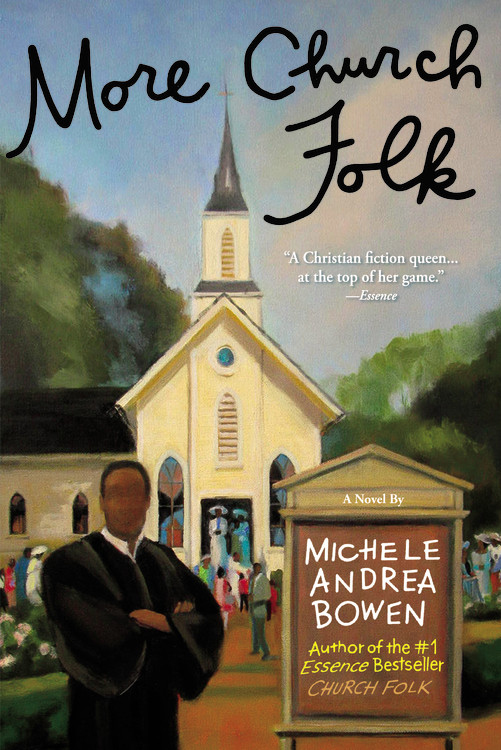
More Church Folk
کتاب های مرتبط
- اطلاعات
- نقد و بررسی
- دیدگاه کاربران
نقد و بررسی

May 17, 2010
If you crossed Eddie Murphy with the Lutherans of Garrison Keillor's Lake Wobegon, you'd get something very like Bowen's Gospel United Church. As another triennial conference rolls around in 1986, the characters of Church Folk are 23 years older, but not all of them are wiser. An election for church bishops promises politicking, corruption, and plenty of well-dressed people. The principal plot complication is a druglike concoction that is both addictive and aphrodisiac, giving the forces of corruption some entrepreneurial ideas. Bowen's got a good eye and a better ear, though it's a little hard to keep all the characters straight, since there's a mess of good guys, bad guys, and assorted wives, sons, and neighbors. Some conservative Christians may find it a bit too raunchy, but even some of those readers will find themselves laughing out loud at certain bits. Underneath it all are acute observations about African-American history and community. Readers who went to church with Bowen before will be delighted to return, and her choir should get bigger.

June 15, 2010
Good and evil do battle again in this folksy follow-up to an Essence magazine bestseller.
The Southern-based Gospel United Church is in trouble again. The African-American church has thrived since its introduction in Church Folk (2001), but as it has spread across the United States and Africa, corruption has followed. The good Reverend Theophilus Simmons now heads up a congregation in St. Louis, where in addition to his own crew of colorful sinners, he must also plan for an upcoming conference. That conference should allow the righteous folk the chance to rein in some errant bishops. But Simmons and company may not be prepared to deal with thieving church officials who want to peddle an African Viagra-like, watermelon-based medicine stateside, using the international church as cover. Bowen (Up at the College, 2009, etc.) never leaves her readers in doubt that the godly will triumph and order will be restored, but she could have had more fun along the way. Although she lays on the colloquial language, making even her educated characters sound like stereotypes, she falls flat when it comes to description. Good is explained simply as being obedient and really meaning it, with more than one church-going character described as lax: "even though she technically qualified for salvation, she never went farther than getting saved." Evil is much more fun, consisting of sex and drugs and corruption. But even that is anemically depicted, with tired sexual clichés for when the watermelon drug, used to boast energy and prowess, wears off, leaving men feeling "like a plop of poop." Since these salacious scenes are probably the real draw, couched as they are in avowedly moral storytelling, the slathering on of adjectives might work for those who limit themselves to strictly Christian fiction. However, that appeal is limited.
Figure in the loss of the hometown camaraderie that made the first Memphis-based book a success, and it's hard to see how this simplistic morality tale will sell.
(COPYRIGHT (2010) KIRKUS REVIEWS/NIELSEN BUSINESS MEDIA, INC. ALL RIGHTS RESERVED.)

June 15, 2010
This sequel to Church Folk finds the Rev. Theophilus Henry Simmons, his wife, Essie Lee, and their three children in St. Louis where he is leading a new congregation. His friend Eddie is running a fast-growing church in Chicago but struggles with the way church affairs continue to be handled. Together, Theo and Eddie take on church politics and thieves who are trying to bleed the coffers dry. VERDICT As with Church Folk, this might be a hard sell to CF readers who expect a gentle story free of sex and profanity. Readers of African American contemporary fiction, however, will love the urban setting and the struggles that Theo and Eddie face.
Copyright 2010 Library Journal, LLC Used with permission.

June 1, 2010
After three ambitious and morally bankrupt bishops discover Watermelon Power 21, they enter into partnerships with criminal elements to raise enough money for a takeover of the next Triennial General Conference of the Gospel United Church in Durham, North Carolina. But WP21 is not just a potent male-enhancement supplement; its seriously addictive and can be fatal if not taken properly. Reverend Denzelle Flowers (whos also an FBI agent) and the other decent preachers who want to end the corruption rampant throughout the church have their work cut out for them. Picking up in 1986, 23 years after the events detailed in Bowens best-seller Church Folk (2001), this inspirational novel uses humor, local color, and vividly descriptive, if startling, language to good effect, ably demonstrating once again why Bowen is the queen of African American Christian fiction. An entertaining and timely look at the politics of religion, Bowens latest sounds a call to action for members of all faiths.(Reprinted with permission of Booklist, copyright 2010, American Library Association.)

























دیدگاه کاربران